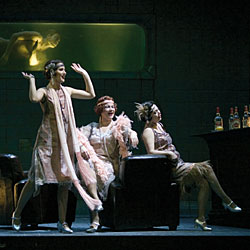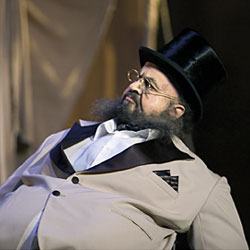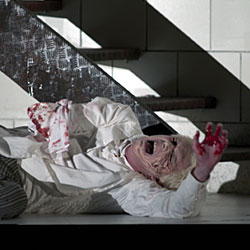An All-Danish Ring
One of the most remarkable things about this Copenhagen Ring cycle is that the cast is entirely Danish (at least as far as I can tell). The Ring features lots of roles (like around 30) and none of them are easy to sing. It’s tough enough just to put together a cast to sing the darn thing. And to do so only using singers from this one, admittedly productive, but quite small country is really remarkable. My sense after listening to the Rhinguldet tonight is that, had the casting director been working with people from all over the world, it’s unlikely that all these particular singers would have been engaged; but to restrict yourself to all Danish singers and even find a complete cast (two, actually, because most of the parts are double cast) who could simply sing the Ring speaks well of the state of singing and singer training in Denmark. We could probably do the same in America; I know we couldn’t if we restricted our search to the state of Washington, which is itself bigger than Denmark. Special favorites at tonight’s Rhinguldet included Stephen Milling (whom we’ve often heard in Seattle) as an adorably sympathetic Fasolt, and the charismatic Sten Byriel as a wild, white-haired, Willem-Dafoe-as-Green-Goblin Alberich.
The dramaturg at Det Koneglige Teater, Henrik Engelbrecht, gave a brief overview to the “concept” of this particular production for audience members standing in the lobby shortly before the Rhinguldet began; he intimated that the production would be about the 20th century, with Rhinegold in the 20s, Walküre in the 50s, Siegfried in 1968, and Götterdämmerung in the late 90s. He also suggested that if there was a message to their production, it could be described as ‘feminist’; ie the many horrors of the twentieth-century can perhaps be attributed to the male energy making all the decisions, and wouldn’t the world be a different (and perhaps better) place if only women were in charge? The expensive program for tonight’s opera also included a synopsis in English featuring such surprising plot points as “When Alberich sees the maidens adoring a handsome young man whom they call the Rhinegold, he feels even more hurt and angry. He kills the man in anguish and steals his heart” or “Wotan meets a woman, Erda, with whom he falls head over heels in love. She reminds him that life should be lived, and he soon realizes that love should not be traded for power” or “Wotan feels he must silence Loge: he knows too much. He transforms him from a god to pure fire.”
It’s probably way too early for me to sit in judgement on any element of this concept. The ideas are certainly interesting, even if they’re very far from the ideas that might have been percolating around inside Richard Wagner’s oversize head while he was thinking about this show.
What I notice about myself, attending a prodution like this one, is what a reactionary-traditionalist I am. I’ve never staged a Ring cycle myself; instead, I’ve attended four, written a set of titles for the whole thing, and made an hour-long children’s opera in English of tonight’s first chapter. But in my fantasy production, we always SEE whatever the imagery might be in the music. I believe Wagner achieved a miraculous synthesis of text and music, and would love to expand that synthesis to include the visual image as well. Thus, I get slightly bent out of shape by productions that not only don’t visualize what’s in the music, or the text, but that go out of their way to visualize something else instead. Example: in the first scene of this opera, there are several long passages of music illustrating stage action: Alberich the clumsy, repulsive dwarf chases three sleek, pretty mermaids around a riverbed. Let’s admit it: Wagner was asking for a lot, this is tough to pull off! It’s hard to make a baritone look like an ugly, scary dwarf; it’s really tough to make a trio of opera singers look and swim like mermaids; and to choreograph a movement sequence to this music which a) looks real, b) doesn’t get repetitive and boring, and c) is tense/dangerous/dramatically interesting is a tall order. BUT THAT’S WHAT IT MEANS TO PUT ON THE SHOW! I find it a cop-out, if, like tonight’s director, you tell everyone to sit in place during that music and wait until the end to re-enter the drama.
A few notes on the unusual things about the staging, for those of you who like this kind of thing. (You others, skip ahead to the bottom!)
- The swimming pool. The first scene was played in an empty swimming pool, with a bar at the bottom; Alberich was a guy at the bar foolish enough to think he could pick up one of three flappers. But of course, women cluster in numbers like that for protection, and he had no chance against the three of them. Cute staging bit: Flosshilde, in the third seduction, gets down on her knees and takes down his pants, as if she’s going to give him a blow job; then she empties the bucket of ice sitting on the nearby bar into his shorts. He then winces as he sings his terrible cry of “Wehe! Wehe! O Schmerz! O Schmerz!” and it was nice to see him in physical pain while he sang that anguished music.
 - - The Rhinegold. The gold here in Denmark is an attractive naked man swimming back and forth in a little fish tank behind the pool; word on the street was he went up for a breath every time he disappeared from our sight. He was beautiful, and his first appearance—as the girls sing their wildly joyous cry of “Rhinegold!”—brought tears to my eyes. A really powerful and unusual image. And as the program implied, at the end of the scene Alberich climbed into the pool, stabbed downwards with a piece of broken glass, and the water turned red. I was happy to read, after the fact, that it was the man’s heart he was removing, ‘cause in the theater I couldn’t see it and didn’t know what body part it was.
- - The Rhinegold. The gold here in Denmark is an attractive naked man swimming back and forth in a little fish tank behind the pool; word on the street was he went up for a breath every time he disappeared from our sight. He was beautiful, and his first appearance—as the girls sing their wildly joyous cry of “Rhinegold!”—brought tears to my eyes. A really powerful and unusual image. And as the program implied, at the end of the scene Alberich climbed into the pool, stabbed downwards with a piece of broken glass, and the water turned red. I was happy to read, after the fact, that it was the man’s heart he was removing, ‘cause in the theater I couldn’t see it and didn’t know what body part it was.
- Fafner the Monopoly Man. Fasolt and Fafner enter by descending, in an elevator we didn’t know was there, from the construction site where they’re finishing work on the Empire State Building of the gods. Fasolt is a big, sweet, dumb, bearded worker-guy in overalls; Fafner is in a wheelchair, with a bow-tie and top hat, and has a ridiculous fat-suit pillow which didn’t look real. He reminds one a little of the tycoon caricature from the boardgame Monopoly; and a little of Lionel Barrymore as Mr. Potter in It’s a Wonderful Life. I deeply appreciated the detailed psychology of the weird relationship between the brothers in this production.
- Alberich’s evil magic. Nibelheim was a mad scientist’s grand guignol dungeon, with various body parts hanging in sacks attached to generators, and, in the center, a large cylinder in which Alberich stood for his transformations. The dragon was nasty-looking, although I couldn’t say exactly what it was; it looked sort of like a larva, sort of like a white asparagus, sort of like a penis. The toad looked like a little plastic toy toad.

- Brutalizing Alberich. The ring in this opera tonight was no ring but rather a bracelet; to get it off the dwarf, Wotan ended up sawing off his arm with a knife. I thought this was probably overkill. It didn’t really scare me, since I had seen it coming, and was more grossed out than surprised. For the top of Scene 4 Alberich was chained, spread-eagled, in a 1920s basement/dungeon that reminded me of a hospital set from one of the Godfather movies. Wotan was increasingly unsympathetic in this scene, while Loge was increasingly pathetic and wimpy.
- Rhinegold stands or falls by its Loge. I can’t say I was a fan of this interpretation of Loge: he was a schlepp, a nabob, a bald guy with a comb-over who smoked way too much and seemed incredibly disorganized and useless as a lawyer. At the end, Loge replays the reel-to-reel tape of his interview with the Rhinedaughters (who sing, in a scratchy 1920s-style recording “Rhinegold! Rhinegold!”) and sings his ironic last line; and then Wotan stabs him with his spear. I wondered why we were jumping to the end of Götterdämmerung already; the program (and Wotan’s subsequent action, taking Loge’s notepad out of his coat and pocketing it) indicate that Wotan felt Loge knew too much. Perhaps, if they are both human beings. But that certainly isn’t what Wagner said; he had both of them gods, with Wotan more powerful than Loge. If the gods were human beings, then ordinary laws of human morality might apply to their behavior; and then you open a door to all sorts of trouble.
So in the end, I can’t say it was an entirely satisfying evening in the theater. But it certainly was interesting (it only sagged a little in the second half of the second scene, where—I find—Rhinegold usually sags), and we had a lively time eating salmon and drinking local Pilsner afterwards, arguing about the production and the singers.


0 Comments:
Post a Comment
<< Home